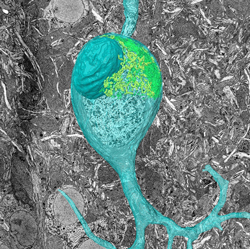Local Researchers Develop Possible Treatment for Parkinson's
Monday, February 10, 2014

Researchers in Rochester have developed a new cell therapy that could treat Parkinson’s disease, a neurological disorder which affects motor function. The study from the University of Rochester Medical Center suggests this new approach could not only halt progression of the disease, but also reverse its impact on the brain.
Now, researchers have found a way to use supporter cells known as astrocytes to spur wider recovery throughout the brain. So we can think of them as a work crew that delivers multiple tools at the same time, each of which can target a different cell population,
says lead author Chris Proschel.
Proschel says they were careful to begin their treatment only after their lab mice had developed signs of Parkinson’s disease. He says this delay is important because it mimics the way therapies are actually used in humans, where damage has occurred and symptoms have presented before any treatment is carried out.
Finding Points to Possible New Parkinson’s Therapy
Tuesday, January 28, 2014
A recent study shows that, when properly manipulated, a population of support cells found in the brain called astrocytes could provide a new and promising approach to treat Parkinson's disease. These findings, which were made using an animal model of the disease, demonstrate that a single therapy could simultaneously repair the multiple types of neurological damage caused by Parkinson's, providing an overall benefit that has not been achieved in other approaches.
One of the central challenges in Parkinson's disease is that many different cell types are damaged, each of which is of potential importance,
said Chris Proschel, Ph.D., an assistant professor of Biomedical Genetics at the University of Rochester Medical Center (URMC) and lead author of the study which appears today in the European journal EMBO Molecular Medicine. However, while we know that the collective loss of these cells contributes to the symptoms of the disease, much of the current research is focused on the recovery of only one cell type.